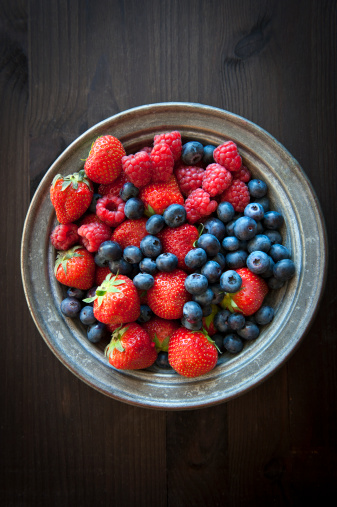
After handing over what feels like your whole paycheck at Whole Foods, it’s not uncommon to wonder whether the health foods you picked up are worth the dough you dropped.
Amid the constant reports about the most superior of superfoods, it can be tough to keep track of not only the healthiest newcomers, but also which previous darlings are still worth your grocery dollar. Eat This, Not That! has rounded up some of the most publicized health foods and analyzed whether their place in your budget is equal to their nutritional benefits.
1. Steel-Cut Oats
Ah, steel-cut oats: One of the most vaunted of health foods, they connote a bearded artisan prepping your breakfast by hand with a blade. But the romance doesn’t match the reality. A can generally runs you upwards of $8, and each bowl requires about 20 minutes of cooking time. That’s not an ideal investment of your money or time, as their nutritional profile is almost identical to rolled oats. Although steel-cut oats have a slightly lower glycemic index, you can feel fine about reaching for a $4 canister of two-minute Quaker Oats: A half-cup serving has only 150 calories plus 4 grams of belly-filling fiber.
2. Low-Carb Bread
At prices topping out at $7 to $8 a loaf, low-carb bread is an inexplicable commodity. Your first-line healthy option is to pick up whole-grain bread instead. While it’s not as ideal a whole grain as quinoa or oats, whole grains of any stripe increase satiety and have heart-protective effects. (Just make sure your bread is whole grain, not multigrain, which has more sugar and less fiber).
3. Fresh Berries
Nutritionally, fresh berries are a totally worthy addition to your grocery bill. But you can still get their benefits while stretching your dollar. Berries possess polyphenols—which prevent fat from forming—and frozen berries have the exact same nutritional value as fresh. Plus they can cost about half as much, and you can get them year-round.
4. Turkey Burgers
Long held to be the far superior alternative to beef, turkey burgers can actually have as much fat and a bit less protein than their more traditional cousin. Plus, store-bought ground turkey can contain dark meat, which boosts the fat content up to 20%. If you want to feel virtuous, go for grass-fed beef, which has belly-blasting omega-3 acids that turkey doesn’t.
5. Pomegranate Juice
Remember this craze? Pomegranate juice is still ringing up tens of millions in sales annually. Don’t contribute. A two-serving bottle can cost you $5, and while you could just eat the fruit—which will give you the same amount of antioxidants plus more fiber and less sugar—it’s far better to eat a cup of blueberries or cranberries instead. They’ll give you almost three times the antioxidants, along with demonstrated fat-burning benefits at a fraction of the cost. Looking for a natural way to supercharge your sex drive? Go ahead and buy; that’s something this drink truly is good at—just be sure to add water before you down a glass.
6. Superfood Powders
Chlorella, camu camu, $30 tubs of green powder with words like “Wonder” and “Vibrance” on the label: they claim to be packed with nutrients, but we can only take their word for it. The nutritional supplement industry is unregulated, and there’s a big question mark about the benefits these supplements provide, particularly in the wake of recent studies that show that multivitamin pills may have little or no benefit. Stick with the tried and true—legit research shows that spinach, chard and Chinese cabbage, among others, burn belly fat.
7. Almond Milk
For those of us simply averse to cow’s milk rather than actually lactose-intolerant, the almond version can be a tasty alternative for cereal and coffee. Just be realistic about what you’re getting: A hydration entity, not a health food. At around $4.50 a carton, almond milk contains very little protein (around one gram) and sweetened versions can have up to 13 grams of sugar. Instead, opt for full-fat or 2% milk, and a pick up a package of almonds for a fat-burning snack. If you’re lactose intolerant, stick with almond milk, but also pick up the package of almonds to get the protein and fat-burning benefits of the nuts that the milk just can’t provide.
8. Whey Protein
It may be the go-to supplement for muscle-builders, but whey protein’s benefits are offset by its tendency to cause belly bloat. And the price makes it a doubly bad deal: A canister can run near $30 for a few dozen servings, which provide—at most—about 25 grams of protein. You can get the same amount of protein from four eggs or a medium-sized chicken breast, which are packed with stuff you want (fat-burning nutrients such as choline, in the case of eggs) and lack the things you don’t (artificial sweeteners and flavors).
9. “Light” Olive Oil
With its heart-protective and weight-loss benefits, olive oil is a health food that needs no substitute. The “light” version doesn’t mean what you think it does. Light olive oil is a highly processed mixture of different oils, and it contains about the same amount of fat as extra-virgin olive oil. It’s just lighter in color. EVOO has higher levels of oleic acid, which researchers say can spot-reduce abdominal fat.
This article originally appeared on Eat This, Not That!
More from Eat This, Not That!:
More Must-Reads from TIME
- Breaking Down the 2024 Election Calendar
- How Nayib Bukele’s ‘Iron Fist’ Has Transformed El Salvador
- What if Ultra-Processed Foods Aren’t as Bad as You Think?
- How Ukraine Beat Russia in the Battle of the Black Sea
- Long COVID Looks Different in Kids
- How Project 2025 Would Jeopardize Americans’ Health
- What a $129 Frying Pan Says About America’s Eating Habits
- The 32 Most Anticipated Books of Fall 2024
Contact us at letters@time.com